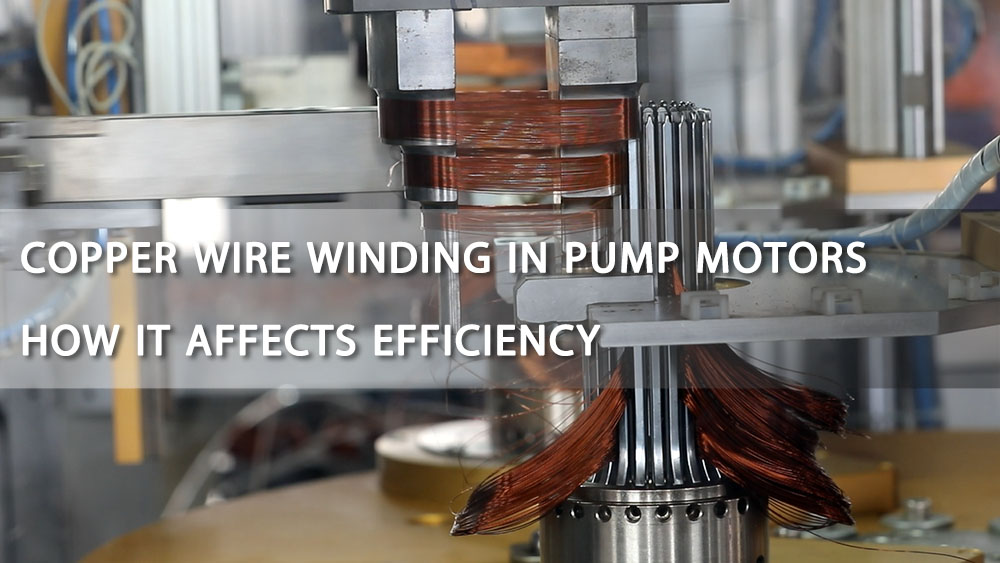+86 13816508465
Pump Knowledge
Jul. 24, 2025

Electric motors play a critical role in driving water pumps across various industries, from household applications to large-scale industrial setups. At the heart of these motors lies the winding material, which directly influences performance, durability, and energy efficiency. Among the various materials available, copper stands out as the gold standard. But why? This blog explores how copper windings enhance the efficiency of pump motors, comparing them to alternative materials like aluminum, and highlights their many benefits for end users.
Motor winding refers to the coils of wire inside the stator or rotor of an electric motor. These windings generate the electromagnetic fields needed to produce motion, turning electrical energy into mechanical energy. The efficiency of this energy conversion depends heavily on the quality of the winding material, with copper being the preferred choice.
Copper winding specifically refers to the use of pure copper wire, which is well-regarded for its excellent electrical conductivity and durability. This material is widely applied across both single-phase and three-phase motors, ensuring effective performance regardless of the motor's configuration.
Other materials, like aluminum, are sometimes used as a cheaper substitute, but they cannot match copper's superior properties, which play a pivotal role in the long-term performance and reliability of pump motors.
The choice of winding material can significantly impact the functionality and cost-effectiveness of an electric motor. Here’s how copper and aluminum compare across key performance metrics:
1. Conductivity
Copper offers up to 60% higher electrical conductivity than aluminum. This means it facilitates more efficient energy transfer, reducing power losses during operation.
2. Thermal Resistance
Copper handles heat much better than aluminum. Motors with copper windings are less prone to overheating, making them more reliable under heavy usage or fluctuating voltage conditions.
3. Durability
Over time, aluminum is more prone to oxidation and physical degradation, which can compromise motor performance. Copper, on the other hand, resists wear and tear, ensuring steadier performance over a longer lifespan.
4. Size Advantage
Because of its higher conductivity, copper can deliver the same performance as aluminum with thinner wires. This allows for more compact motor designs without sacrificing efficiency.
5. Cost
Aluminum is undeniably cheaper upfront, but it's a case of paying more over time. Motors with aluminum windings are less efficient, leading to higher operating costs in energy consumption and maintenance.
The efficiency of a pump motor isn't just a matter of initial design—it's influenced by how well the motor runs over time. Copper windings provide distinct advantages in the following areas:
1. Lower Electrical Resistance
Copper's superior conductivity reduces electrical resistance within the windings. This minimizes energy losses during operation, allowing more power to be effectively transferred from the motor to the pump.
2. Improved Power Factor
Motors with copper windings ensure better energy transfer from the power supply to the pump. This results in a higher power factor—essentially, less wasted energy.
3. Reduced Motor Heating
Copper's thermal resistance helps prevent overheating. Cooler operation enhances motor life, reducing the frequency of repairs or replacements.
4. Stable Current Flow
Copper provides a steadier flow of current, which translates to consistent pump performance, even under variable loads.
5. Energy Savings Over Time
For commercial or agricultural users running pumps continuously, the energy savings from copper-wound motors can result in substantial cost reductions over months and years.
Whether you are an individual homeowner or an industrial operator, investing in copper-wound motors can yield tangible benefits:
1. Household Pumps
Homeowners will appreciate quieter operation and lower utility bills. Copper-wound motors are also less prone to sudden breakdowns, providing peace of mind for daily water-pumping needs.
2. Agricultural Pumps
For farmers, copper-wound pumps excel in handling fluctuating voltages typically encountered in rural setups. They can run for extended hours without overheating, ensuring reliable performance during high-demand periods such as irrigation.
3. Industrial Pump Applications
Industries often rely on motors that run 24/7, and any downtime can be costly. Copper-wound motors deliver better energy efficiency, leading to lower operating costs and reduced maintenance expenses over time.
Case Example:
A manufacturing plant replaced its aluminum-wound pump motors with copper-wound alternatives and reported an 18% annual energy savings, equivalent to thousands of dollars, while also reducing motor-related downtime by 25%.
Want to make sure you're purchasing a motor built with copper windings? Follow these tips:
Inspect the Product Label: Look for terms like 【100% copper winding】 or similar designations in the technical specifications.
Ask for Supplier Confirmation: Reputable suppliers should be able to provide certification or documentation verifying the use of pure copper windings.
Beware of Substitutes: Some products may use copper-clad aluminum (CCA) wires, which are coated with copper but lack its full performance benefits.
Check the Weight: Copper-wound motors are generally heavier than their aluminum counterparts due to the density of copper.
Although copper-wound motors may come with a higher upfront price, they make economic sense in scenarios where efficiency, durability, and reliability are top priorities. Choose copper-wound motors if:
The pump will be used frequently or continuously, such as in industrial, agricultural, or heavy commercial applications.
You value long-term savings on energy bills and reduced maintenance costs.
You need solutions compatible with energy regulations or incentive programs that reward efficient systems.
OEMs manufacturing pump systems can benefit from reduced return rates and enhanced customer satisfaction.
While aluminum-wound motors may seem cost-effective initially, the long-term benefits of copper-wound motors make them a superior choice for many users. From improved efficiency and lower energy costs to reduced downtime and extended motor lifespan, copper ensures unparalleled reliability.
When selecting your next pump motor, prioritize those with genuine copper windings to maximize value and performance. Consult reputable manufacturers who clearly specify the materials used in their lineups. It’s an investment worth making for sustainable, energy-efficient solutions.
Make the smarter choice—choose copper, invest in efficiency, and experience the difference.
Address
No.17 XeDa Jimei Ind. Park, Xiqing Economic Development Area, Tianjin, China
Telephone
+86 13816508465
QUICK LINKS